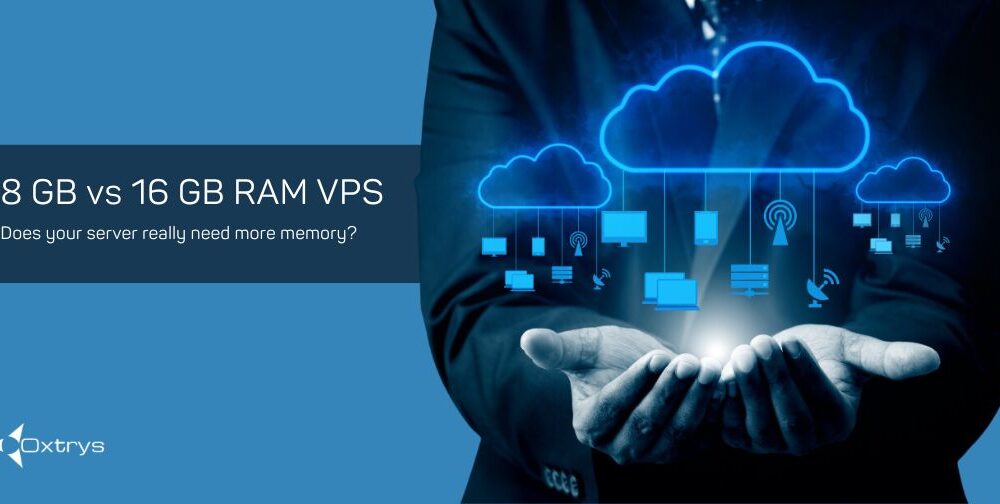8GB RAM vs 16GB RAM – Is More RAM Always Better For Your Server?

A slow server can be a nightmare, with slow load times and performance bottlenecks. The default answer is to upgrade your RAM, but is it always better?
In fact, 8GB versus 16GB of RAM is a crucial decision that will impact the speed, stability, and scalability of your server. But does extra memory really improve performance, or is it a waste of money?
Scroll below to understand how RAM impacts your server and whether 8GB or 16GB is the right choice for your needs.
What Does RAM Do in a Server?
Random Access Memory (RAM) is a volatile, high-speed storage unit that enables vps server to handle applications, process requests, and manage workloads efficiently. The running server loads data into its RAM; this way, it does not need to read data from slower storage media like SSD or HDD.
How RAM Affects Server Performance?
- Faster Data Access: The more RAM available, the quicker your server can access essential files.
- Multitasking & Load Handling: Higher RAM capacity allows your server to run multiple applications simultaneously without slowdowns.
- Caching & Performance Optimization: Allocation of RAM gets optimized and enhances speed by holding frequently utilized data.
If your server lacks sufficient RAM, it may face challenges when handling concurrent tasks, resulting in lag, crashes, or slow responses for businesses that run websites, databases, or cloud-based applications.
Why Choosing the Right RAM Size Matter?
The decision to go with either 8GB RAM VPS or 16GB RAM VPS isn’t solely a matter of performance—it’s also a matter of cost, efficiency, and scalability.
Common Server RAM Requirements by Use Case
| Use Case | Recommended RAM |
| Basic website hosting | 4GB – 8GB |
| E-commerce platforms | 8GB – 16GB |
| Game servers | 16GB – 32GB |
| Cloud hosting | 16GB – 64GB |
| AI & Data Analytics | 32GB+ |
8GB RAM is usually enough for your personal or small business websites. Still, you will need at least 16GB RAM (or more) for resource-heavy applications, including database systems, virtual machines, or cloud hosting.
Key Factors to Consider When Choosing Between 8GB and 16GB RAM
Selecting the right RAM size for your server isn’t just about picking the biggest number—it’s about aligning your choice with your workload, operating system, scalability needs, and budget. Below are the four most important factors to consider:
1. Workload Requirements
RAM requirement differs greatly based on how your server works and what type of tasks it is doing. 8GB RAM might be enough if you’re running basic applications, a single website, or a low-traffic blog. However, if your server has to handle database management, virtualization, or a cloud application, 16GB RAM VPS will run without bottlenecks.
🔹 8GB RAM – Small websites, personal blogs, and lightweight application hosting.
🔹 16GB RAM – Best for business websites, e-commerce platforms, and cloud-based applications.
🔹 More than 16GB RAM – Recommended for game servers, AI/ML workloads, and enterprise applications.
🔹 Check your software requirements – Some applications explicitly list minimum RAM recommendations.
2. Server Operating System
RAM requirements vary depending on the operating system (OS). Windows-based servers have a higher memory consumption, and Linux servers are more effective and can run quite well even with less RAM. For the GUI, you must expect more RAM consumption.
🔹 Linux Servers – More efficient; can function well with 8GB RAM for most tasks.
🔹 Windows Servers – Heavier resource consumption; 16GB RAM is often recommended.
🔹 Bare-metal vs. Virtualized Environments – Running multiple virtual machines (VMs) demands more RAM.
🔹 Control Panels & Background Services – cPanel, Plesk, and other management tools consume additional RAM.
3. Future Scalability
Your current RAM usage may be adequate, but what will happen in six months or a year?
Well, if you know your web traffic requirements, hosted applications, or know that the business will expand, then 16GB upfront will save you from extra hardware upgrades down the line.
🔹 Plan for Growth – Opt for more RAM now if you expect increased visitors.
🔹 Cloud & VPS Hosting – Easier to scale compared to dedicated servers.
🔹 Upgrade Costs – Adding RAM later may be expensive and require downtime.
🔹 Multitasking Considerations – More RAM allows multiple applications to run without performance dips.
4. Budget Considerations
More RAM equals better performance but also a higher price. On a lower budget, you may have to compromise on RAM capacity against other performance metrics , such as the CPU and SSD storage. But in the long run, underinvesting in RAM might slow down your server, and this could cost you both in money and revenue.
🔹 Cost vs. Performance – Weigh the performance gains of 16GB RAM against your budget.
🔹 Alternative Optimizations – SSD storage and caching can sometimes compensate for lower RAM.
🔹 Short-Term vs. Long-Term Investment – Spending more on RAM now may prevent costly upgrades later.
🔹 Hosting Provider Options – Some VPS and Cloud Hosting Providers enable you to increase RAM when needed.
Evaluating these criteria will equip you to decide whether 8GB or 16GB of RAM is optimal for your server’s efficiency requirements.
Tips for Optimizing Your Server’s RAM Usage
Even if you only have 8GB RAM, you can boost server efficiency with these tips:
1. Enable RAM Caching
Implement caching with tools such as Redis or Memcached to store frequently accessed data in RAM.
2. Optimize Background Processes
Reduce unnecessary processes running in the background to free up RAM for critical tasks.
3. Upgrade to SSD Storage
A high-speed SSD complements RAM performance by handling data transfers more efficiently than HDDs.
4. Adjust Swap Space Settings
If RAM is running low, swap memory can act as an overflow buffer—though it’s slower than actual RAM.
5. Optimize Software & Applications
Choose lightweight applications, optimize databases, and use performance monitoring tools to manage RAM usage effectively.
In most cases, having more RAM is always beneficial, but only if your server actually needs it.
Benefits of 16GB RAM Over 8GB
✅ Faster Load Times: Reduces lag in web hosting and application performance.
✅ Better Stability: Handles more users and concurrent processes without crashing.
✅ Enhanced Virtualization: Multiple Virtual Private Servers (VPS) or even cloud-based applications.
✅Future Proofing: Prepares your server for scaling, without consistent hardware upgrades.
When Is 8GB RAM Enough?
🔹 Hosting a small website or blog
🔹 Running low-traffic applications
🔹 Operating a bare VPS with minimal workloads
If you are running a business website, e-commerce store, gaming server, or cloud application, then 16GB RAM would be the right choice.
Conclusion
So, is more RAM always better for your server? Yes, but only when it’s necessary. For servers running essential services, 8GB RAM may be sufficient. If you are dealing with high-traffic websites, databases, or several applications, 16GB RAM offers better performance and stability.
Providing high-performance server solutions with Oxtrys. This machine offers the fastest performance and , as you can expect, peak effectiveness whether you run a VPS, dedicated server, or cloud hosting.
You can see our latest server specifications and upgrade options for High-Performance USA VPS Hosting.

Source: 8GB RAM vs 16GB RAM – Is More RAM Always Better For Your Server?




